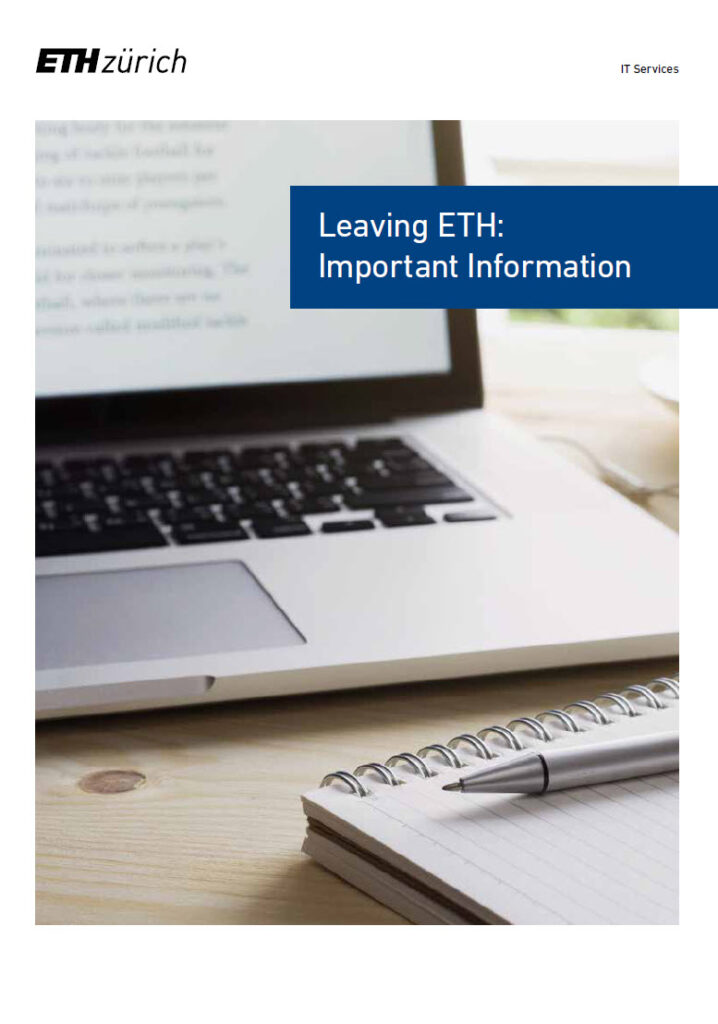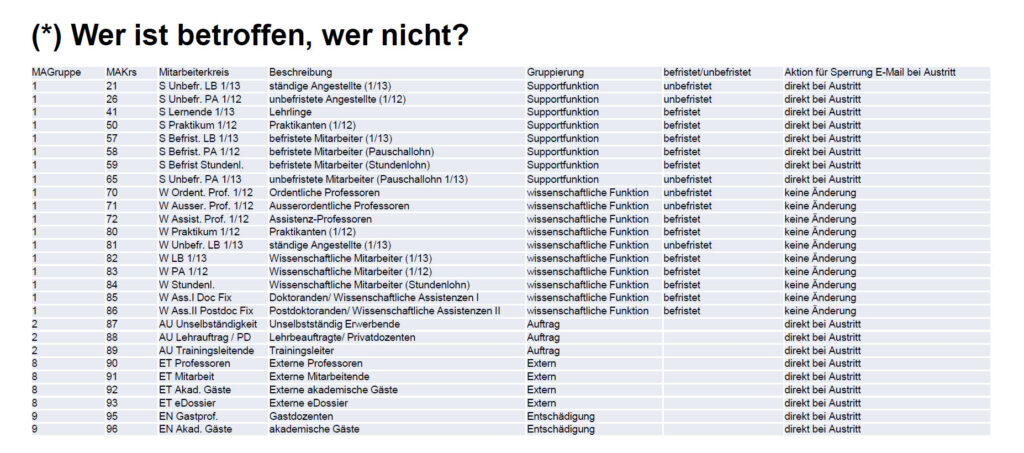Administrative-technical ETH employees: Adjustments on leaving ETH Zurich
The cancellation of the 180-day period for the blocking of accounts following the resignation of administrative-technical employees of ETH Zurich has been in place since 8 July 2021. As of 9 July 2021, the accounts of departing administrative-technical employees of ETH Zurich will therefore be blocked immediately upon leaving.
Scientific positions and retirements with service usage are treated separately. These two groups of people are therefore not affected in any way at present and will not be dealt with until 2022.

In the «Leaving ETH» brochure, we have adjusted the passages as follows:
- https://ethz.ch/content/dam/ethz/associates/services/Service/IT-Services/files/broschueren/en/exit-en.pdf
- https://ethz.ch/content/dam/ethz/associates/services/Service/IT-Services/files/broschueren/de/exit-de.pdf
6. Effects of expiry, blocking of services
The last ETH services expire when leaving ETH Zurich (or 180 days thereafter for students, lecturers and scientific employee). Without the VPN service, you will no longer have access to your NAS home directory or your connected network drives from home. The ETH user account, mailbox, home directory, network access and polybox will also be deactivated.
The polybox data is deleted when the ETH user account is blocked. You no longer have any access to your home directory or your personal ETH homepage.
7. Handing over personal data
All data will be irrevocably deleted from the ETH user account after expiry. Before you leave, please remember to hand over important data to your department.
19. Email absence notifications
Employees should clarify with their supervisor before leaving whether an absence or leaving notification should be set up. This is intended to provide information on who else the sender can contact if you leave ETH Zurich altogether. You can set this up, for example, via Web Access under Extras or Options > Email > Out of Office Assistant / Automatic replies https://mail.ethz.ch
It should also be noted that once the access of an employee who has left has been deleted, no one will have access to their mail account or the data stored in it. Any mail forwarding («forwards») will be deleted when leaving.
Presentation of Dr. Giorgio Broggi at the ITEK on 16 June 2021
Departure of administrative-technical staff: Immediate blocking of the mailbox service
Initial situation
- A user receives a mailbox through the assignment of the mailbox service in the IAM system. The mailbox service is assigned to all ETH members. Through the assignment of the mailbox service in the IAM system, the user receives the address username@ethz.ch.
All users have this and it cannot be deleted as long as a mailbox exists. These addresses are not recycled. - For users of other email systems (e.g. D-PHYS), a forward to the department’s mail system is set up manually.
- When you leave ETH, nothing happens in the service area at the moment. At the moment you can therefore receive and send emails after leaving. These mailboxes are only deleted 180 days later.
New rules since 8 July 2021
The steering committee of the «Authorisation Management» project decided on the following new rule at its meeting on 9 April 2021, which was implemented immediately:
- For ETH members who only have an administrative-technical position (*) (i.e. for whom there is no active enrolment, no current lecturer period and no other positions in the academic area), the blocking of all services (incl. the mailbox service) and the deletion of mail forwarding («forwards») takes place at the time of departure from the ETH.
- Until further notice, the exception to this rule is retirement with ETH service usage: Here, the services will continue to exist without any changes. The only difference in such cases is the assignment of the primary address username@retired.ethz.ch. The address username@ethz.ch remains as an alias.
(*) Who is affected, who isn’t?

Exception to this rule (e.g. for the few employees of platforms who are employed in an administrative-technical role, but who are active in research) must be approved (restrictively) by the HR department.
Blocking, deletion, forwarding, out-of-office messages
- The blocking of a mailbox means that: The person in question can no longer access the mailbox (i.e. read old emails) because the AD account is blocked.
- The deletion of a mailbox, on the other hand, means the physical destruction of the information in the mailbox.
- Forwarding to another address can be defined by the users in the IAM system. For administrative-technical employees, it remains active as long as the departure from the ETH has not yet taken place. For other ETH members, this is the case until the mailbox is deleted.
- Absence/out-of-office messages can be set up by users in the mail client. No automatic actions are set up. They remain active as long as the mailbox is not deleted.
Contact
- Dr. Giorgio Broggi, Head of ITS Software Services, IT Services
- Davor Kupresak, Group Manager Identity/Access Management & eServices, ITS Software Services, IT Services
erstellt am
in News



Update 27.7.2021 of the exit brochures in several sections like ASVZ etc.
Among others also point 6
When administrative-technical employees leave, their last ETH services expire. This applies to ETH members who have solely administrative-technical employment (i.e. for whom there is no active enrolment, no current lecturing period and no other employment in the scientific area). For these administrative-technical employees, the blocking of all services (incl. mailbox service) and the deletion of the forwardings («forwards») will take place at the same time as their departure.
For students, lecturers and academic staff, these services will continue to exist for 180 days after leaving.